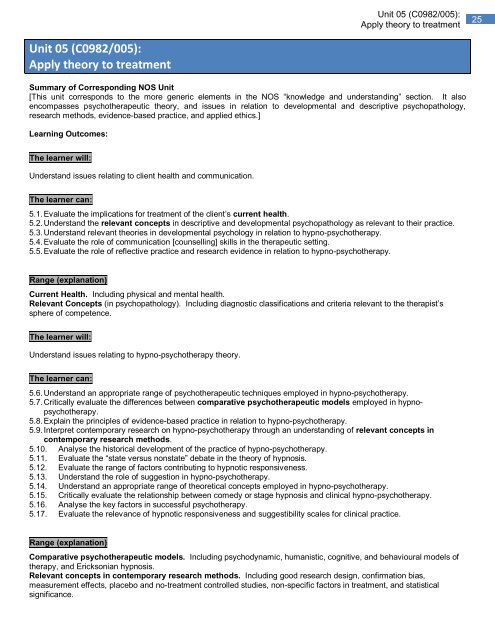Diploma in Cognitive-Behavioural Hypnotherapy - REBHP
Diploma in Cognitive-Behavioural Hypnotherapy - REBHP
Diploma in Cognitive-Behavioural Hypnotherapy - REBHP
You also want an ePaper? Increase the reach of your titles
YUMPU automatically turns print PDFs into web optimized ePapers that Google loves.
Unit 05 (C0982/005):Apply theory to treatment25Unit 05 (C0982/005):Apply theory to treatmentSummary of Correspond<strong>in</strong>g NOS Unit[This unit corresponds to the more generic elements <strong>in</strong> the NOS ―knowledge and understand<strong>in</strong>g‖ section. It alsoencompasses psychotherapeutic theory, and issues <strong>in</strong> relation to developmental and descriptive psychopathology,research methods, evidence-based practice, and applied ethics.]Learn<strong>in</strong>g Outcomes:The learner will:Understand issues relat<strong>in</strong>g to client health and communication.The learner can:5.1. Evaluate the implications for treatment of the client‘s current health.5.2. Understand the relevant concepts <strong>in</strong> descriptive and developmental psychopathology as relevant to their practice.5.3. Understand relevant theories <strong>in</strong> developmental psychology <strong>in</strong> relation to hypno-psychotherapy.5.4. Evaluate the role of communication [counsell<strong>in</strong>g] skills <strong>in</strong> the therapeutic sett<strong>in</strong>g.5.5. Evaluate the role of reflective practice and research evidence <strong>in</strong> relation to hypno-psychotherapy.Range (explanation)Current Health. Includ<strong>in</strong>g physical and mental health.Relevant Concepts (<strong>in</strong> psychopathology). Includ<strong>in</strong>g diagnostic classifications and criteria relevant to the therapist‘ssphere of competence.The learner will:Understand issues relat<strong>in</strong>g to hypno-psychotherapy theory.The learner can:5.6. Understand an appropriate range of psychotherapeutic techniques employed <strong>in</strong> hypno-psychotherapy.5.7. Critically evaluate the differences between comparative psychotherapeutic models employed <strong>in</strong> hypnopsychotherapy.5.8. Expla<strong>in</strong> the pr<strong>in</strong>ciples of evidence-based practice <strong>in</strong> relation to hypno-psychotherapy.5.9. Interpret contemporary research on hypno-psychotherapy through an understand<strong>in</strong>g of relevant concepts <strong>in</strong>contemporary research methods.5.10. Analyse the historical development of the practice of hypno-psychotherapy.5.11. Evaluate the ―state versus nonstate‖ debate <strong>in</strong> the theory of hypnosis.5.12. Evaluate the range of factors contribut<strong>in</strong>g to hypnotic responsiveness.5.13. Understand the role of suggestion <strong>in</strong> hypno-psychotherapy.5.14. Understand an appropriate range of theoretical concepts employed <strong>in</strong> hypno-psychotherapy.5.15. Critically evaluate the relationship between comedy or stage hypnosis and cl<strong>in</strong>ical hypno-psychotherapy.5.16. Analyse the key factors <strong>in</strong> successful psychotherapy.5.17. Evaluate the relevance of hypnotic responsiveness and suggestibility scales for cl<strong>in</strong>ical practice.Range (explanation)Comparative psychotherapeutic models. Includ<strong>in</strong>g psychodynamic, humanistic, cognitive, and behavioural models oftherapy, and Ericksonian hypnosis.Relevant concepts <strong>in</strong> contemporary research methods. Includ<strong>in</strong>g good research design, confirmation bias,measurement effects, placebo and no-treatment controlled studies, non-specific factors <strong>in</strong> treatment, and statisticalsignificance.


